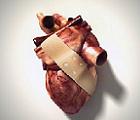 CorInnova, Inc. is a privately held biomedical device company based in Houston, Texas. The company develops technologies aimed at recovery for patients with end stage heart failure. Their target market is 70,000 bedridden American heart failure patients with irregular heartbeats that can lead to muscle cell death, fibrosis, infarct expansion and heart failure.
CorInnova, Inc. is a privately held biomedical device company based in Houston, Texas. The company develops technologies aimed at recovery for patients with end stage heart failure. Their target market is 70,000 bedridden American heart failure patients with irregular heartbeats that can lead to muscle cell death, fibrosis, infarct expansion and heart failure.
CorInnova is currently trialing a cardiac compression device known as CorAmend that can be implanted and explanted without ever contacting the patient’s blood through a minimally invasive procedure.
Based on the theory that a patient’s failing heart can be rehabilitated by restoring the proper cardiac motions, this device is comparable to the use of physical therapy in repairing joint injuries. Known as cardiac rekinesis therapy (CRK), the therapy is being considered an alternative to heart transplant – the current standard for patients in end stage heart failure.
Currently, about 230,000 patients are in the end stage of this debilitating condition, and they have about a 40 percent mortality rate over two years. Drug therapies are considered largely ineffective and the donor to need ratio is huge (2,400 donor hearts to 100,000 patients in waiting). About 2,500 patients a year receive left ventricular assist devices (LVADs), but the surgery is invasive.
Additionally, the LVAD device comes in contact with the blood, which could involve blood clots and stroke from the required anti-coagulate therapy. The LVAD therapy is considered a treatment of symptoms, not a recovery method.
The CorAmend device applies gentle pressure to the heart muscle and alleviates stress from the damaged cardiac muscle. It does not alter the shape of the heart, but instead reduces stress so that the muscle can resume healthy motion and begin remodeling. The device is shaped around the heart muscle and is considered a combination therapy with existing CHF therapies.
LVADs currently bring in about $500 million in annual revenue and the market projection is a 27 percent annual increase over the next five years. Estimates put 8,000 patients per year receiving the devices, which amounts to over $1 billion in annual sales. With improved devices such as restorative therapies could double this market to $2 billion or more in sales per year.
With costs for heart failure treatment at an estimated $50 billion dollars per year, this step into cardiac rehabilitation could lower costs in the long-term and provide more treatment options for heart failure patients.
CorInnova will be presenting its products and technologies at OneMedForum SF 2012, on January 9 – 12.